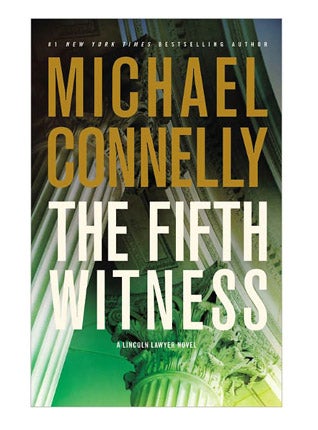The Fifth Witness, By Michael Connelly
A story that gives society little credit

Your support helps us to tell the story
From reproductive rights to climate change to Big Tech, The Independent is on the ground when the story is developing. Whether it's investigating the financials of Elon Musk's pro-Trump PAC or producing our latest documentary, 'The A Word', which shines a light on the American women fighting for reproductive rights, we know how important it is to parse out the facts from the messaging.
At such a critical moment in US history, we need reporters on the ground. Your donation allows us to keep sending journalists to speak to both sides of the story.
The Independent is trusted by Americans across the entire political spectrum. And unlike many other quality news outlets, we choose not to lock Americans out of our reporting and analysis with paywalls. We believe quality journalism should be available to everyone, paid for by those who can afford it.
Your support makes all the difference.It's a moot point just how responsibly popular fiction can address serious issues of the day, as opposed to simply mining such things for material.
But as ammunition for those who feel that crime fiction is a formidable tool, Michael Connelly's The Fifth Witness is useful. This is a trenchant novel that, within the framework of a diverting entertainment, makes some persuasive points about a nation in thrall to the banks (the US, but, by extension, this country) – and about the limits of personal responsibility.
The issue of foreclosures – the incendiary topic that has brought about so many economic woes – powers the plot. Connelly's opportunistic but sympathetic lawyer, Mickey Haller, is making a speciality of keeping roofs over his clients' heads. A whole industry has grown up around the burgeoning foreclosures, involving manipulative bankers, crooked brokers and even untrustworthy activists. By pointing out the loopholes used by the banks to evict people from their homes, Mickey is able to buy some precious breathing space. But he is no idealist, and is well aware that his clients are in situations of their own making.
His most tricky client is volatile Lisa Trammel, who has made herself massively unpopular with the bank trying to evict her by staging street demonstrations and harassment of bank personnel (she is under a restraining order). Mickey, while fighting her corner, is wryly aware that Lisa spends very little time considering that she needs to pay her debts. Things become much darker when mortgage broker Mitchell Bondurant is murdered – and Lisa is in the frame. Mickey (while harbouring doubts) moves into high gear in order to defend her. He has a mass of problems, not least his client's personality, but as Mickey learns about the murder victim's dubious subsidiary businesses, it becomes clear that nothing is as it seems.
As ever, Connelly makes Mickey the perfect conduit through the hazardous jungles of LA courtrooms and low-rent neighbourhoods. But the social underpinnings here are what really engage the author: The Fifth Witness will not be comfortable reading for bankers, but neither is it indulgent towards those who feel that the world owes them a house and a living. Mickey may champion the latter, but he knows that most of his clients will end up on the scrapheap. This is as diverting an outing for Connelly's hero as we have been granted.
Join our commenting forum
Join thought-provoking conversations, follow other Independent readers and see their replies
Comments